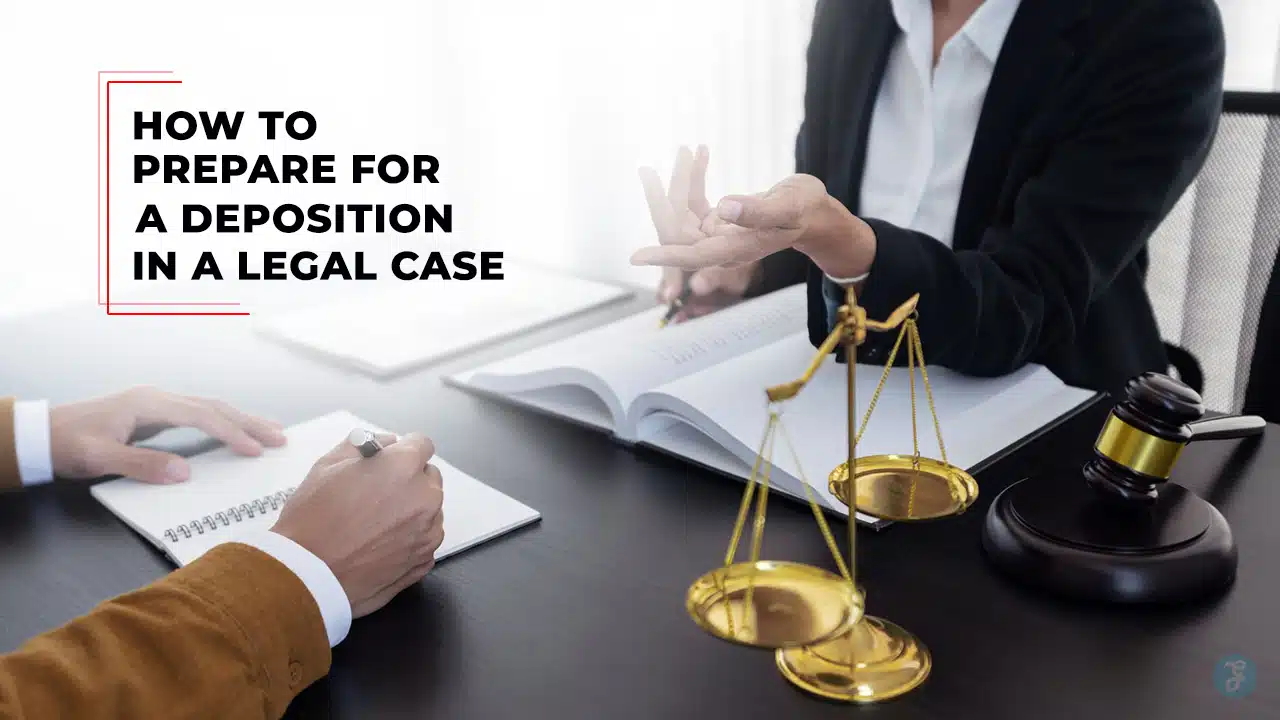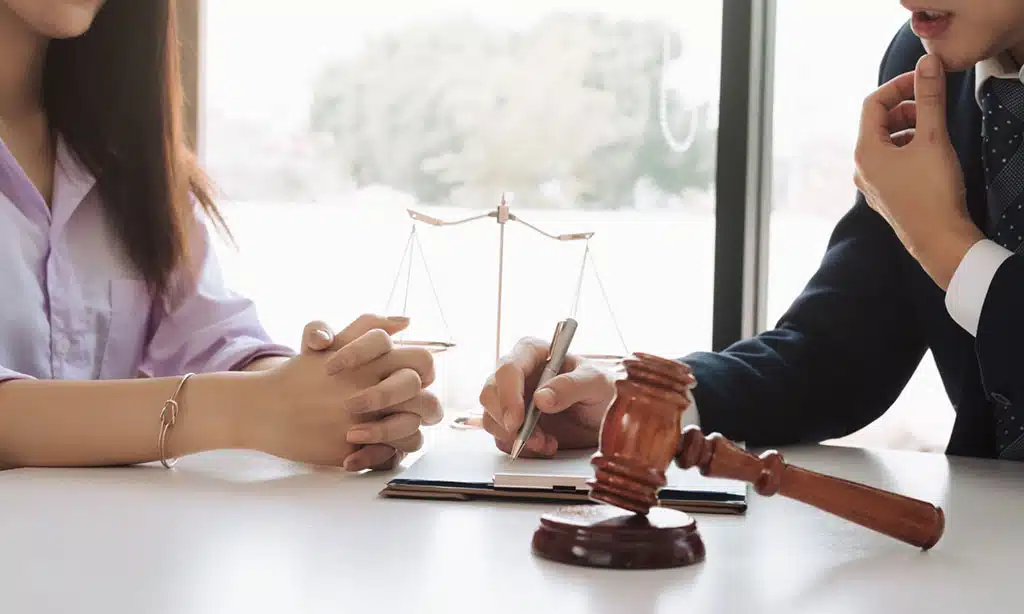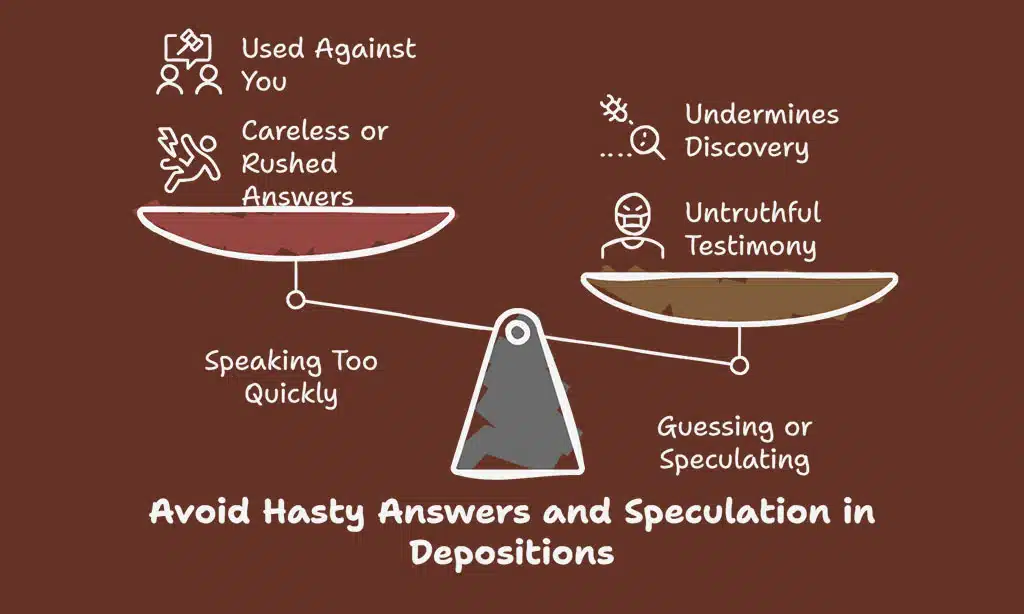Facing a deposition can feel stressful. You might worry about saying the wrong thing or not knowing what to expect. It’s normal to feel unsure, especially if this is your first time being deposed.
A deposition is a critical step in many legal cases, including personal injury lawsuits. What you say under oath could impact the outcome of your case. The good news? With preparation, you can handle it with confidence.
This guide will help you understand how depositions work and how to get ready for yours. Keep reading—you’ll thank yourself later!
Key Takeaways
- A deposition is part of the legal process where you answer questions under oath. It helps gather facts and prepare for trial.
- Review your case details with your attorney, know the documents, and practice clear answers to stay prepared.
- Stay calm during questioning, think before answering, and avoid guessing or adding extra information.
- Opposing counsel may try tricky questions or pressure you. Keep answers honest and stick to what you know.
- Your attorney guides you through preparation, explains your rights, and ensures you’re ready to testify confidently.
Understand the Purpose of a Deposition
A deposition helps collect facts before a trial. It allows attorneys to question witnesses under oath in a relaxed setting. The answers go on record and may appear later in court.
Depositions are part of the discovery process. They reveal evidence, clarify complaints, and test theories for both sides. Rules like ORCP 39 in Oregon guide how depositions work legally.
Key Steps to Prepare for a Deposition
Getting ready for a deposition takes focus and effort. Careful preparation can make the process less stressful, helping you give clear, truthful answers.
Review the facts of the case thoroughly
Go over every detail of the case with care. Work closely with your attorney to refresh your memory. Focus on key events, dates, and people involved. Leave no stone unturned when reviewing facts.
This step helps you give clear and accurate testimony during the deposition.
Avoid bringing personal notes or diaries to the meeting. Such items may be requested by opposing counsel if present. Trust what you’ve reviewed with your lawyer instead of relying on documents you might not need in court sessions or while testifying under oath!
Familiarize yourself with relevant documents and evidence
Study every document tied to the case. Review contracts, emails, and other records carefully. Know your deposition outline and the facts like the back of your hand. If expert witnesses or a subpoena duces tecum are involved, understand their role.
Pay attention to details in discovery process materials. Highlight important points that may come up during cross-examination. Keep all evidence organized for easy reference. Ask your attorney about rules of evidence if you’re unsure about anything specific.
Anticipate potential questions from opposing counsel
Expect opposing counsel to ask tough, direct questions. They might focus on weak spots in your case or test your memory of events. Review the facts and deposition transcript carefully.
Think about questions they could use to twist details or confuse you.
They may bring up related documents, evidence, or past statements. Study these ahead of time so answers match the record. If expert witnesses are involved, prepare for technical inquiries tied to their testimony.
Be clear and stick only to what you know without guessing or adding extra information.
Practice answering questions concisely and truthfully
Answer clearly and to the point. Speak truthfully, but do not over-explain. A short answer is often better than a long one. For example, if asked, “Did you see the traffic signal?” just say “Yes” or “No.” Avoid adding unnecessary details unless asked directly.
Stick to facts you know for sure—guessing can hurt your testimony. If unsure about something in the discovery process of a civil lawsuit, simply say, “I don’t recall.” Always focus on what is true and stay calm under questioning by opposing counsel.
Tips for Responding During a Deposition
Stay calm, and take your time before speaking. Short, clear answers keep you on solid ground.
Think before answering
Pause before speaking. Take a moment to process the question fully. Rushing might lead to mistakes or unclear answers. Opposing counsel may try tricky wording, so stay sharp.
Keep answers honest and brief. Avoid spilling extra details that weren’t asked for. A clear head helps avoid common legal pitfalls during deposition preparation.
Avoid volunteering unnecessary information
Stick to the question asked. Lawyers may twist extra details into something harmful. For example, if asked, “Did you see anything unusual?” only answer yes or no. Do not explain unless they ask directly.
Adding unnecessary facts may hurt your truthful testimony. Opposing counsel might use casual comments against you during cross-examination. Keep answers simple to avoid trouble in the deposition transcript later on.
Ask for clarification if a question is unclear
Confusing questions happen in depositions. Politely ask for clarification if you don’t understand a question. Opposing counsel may try to use tricky words or vague statements to confuse you.
Saying, “I don’t understand,” or asking them to rephrase is your right.
Avoid guessing answers. Clear communication protects your truthful testimony and the deposition transcript’s accuracy. It also stops misunderstandings during the discovery process later on.
Always remain calm and professional
Staying calm helps you think clearly. Opposing counsel might try to frustrate or confuse you. Do not let their tactics upset you. Take a deep breath if needed before answering.
Speak in a steady tone, even when pressed with hard questions. Avoid raising your voice or showing anger. A calm and professional demeanor shows confidence and credibility under oath during the discovery process.
It also ensures the deposition transcript reflects your composed nature without mistakes caused by reactionary emotions.
Strategies to Handle Opposing Counsel
Keep your cool, avoid rising to bait, and know their tactics can’t shake solid testimony—read on for smart moves.
Recognize common tactics used by opposing attorneys
Opposing attorneys may try to confuse you with tricky questions. They might ask the same thing in different ways, hoping you’ll change your answer. This can make your truthful testimony seem unsure or unclear.
Some lawyers act friendly to gain your trust and get extra details. Others may interrupt or pressure you to rush answers. Stay calm, think carefully, and give clear replies during cross-examination.
Stay composed under pressure
Stay calm if opposing counsel uses tricky tactics. They may try to confuse or upset you. Take a deep breath and think before responding. Speak slowly, even if the court reporter is typing fast.
Staying in control shows confidence and helps protect your truthful testimony.
If a question feels too aggressive, keep your tone neutral. Avoid snapping back or raising your voice. A professional response can disarm anyone trying to rattle you. Showing grace under pressure strengthens your deposition transcript and keeps the process on track.
Avoid arguments or emotional reactions
Stay calm if opposing counsel pressures you. Lawyers may use tricks to unnerve you during a deposition. Raising your voice or getting upset can hurt your testimony. Keep a steady tone and stick to the point.
If questions feel unfair, pause before speaking. Take deep breaths to stay collected. A clear mind helps prevent mistakes in answers. Keep emotions out of it; they distract from delivering truthful testimony under oath.
Common Mistakes to Avoid During a Deposition
Rushing through answers can lead to slips that hurt your case. Stick to facts, not guesses, to avoid digging a deeper hole.
Speaking too quickly or without thinking
Talking too fast can hurt your testimony. Quick answers may seem careless or rushed. Opposing counsel might use this against you during the deposition transcript review.
Speaking before thinking increases mistakes. It could lead to wrong facts, guesses, or off-topic opinions. Take a moment to think clearly before responding under oath.
Guessing or speculating on answers
Guessing can harm your deposition. Stick to facts you know for sure. If you’re unsure, say so plainly. Opposing counsel might try to confuse or rush you, but stay calm.
Speculating leads to mistakes that hurt your case. Avoid filling in gaps with assumptions or opinions. Your truthful testimony is key in the discovery process—guessing undermines it completely!
Offering opinions outside your expertise
Stick to what you know. Sharing opinions outside your expertise can harm your testimony. For example, if asked about expert witnesses’ findings or technical details in a deposition transcript, say you don’t know, unless you are qualified to answer.
Guessing or speculating may weaken your truthful testimony. Opposing counsel might twist these statements during cross-examination as part of the discovery process. Stay clear and focused on facts you understand instead of venturing into areas beyond your knowledge.
The Role of Your Attorney in Deposition Preparation
Your attorney acts as your guide. They help you feel ready and confident to testify under oath.
How they help you prepare
Attorneys guide you through deposition preparation step by step. They review the rules of your case to avoid surprises. They also go over possible questions opposing counsel may ask.
This helps you feel ready and confident.
They teach you how to answer truthfully while staying on point. Avoiding legal trouble is their top goal. They explain your rights fully, so nothing catches you off guard during the process.
Ensuring you understand your rights and responsibilities
Know your rights to protect yourself. You have the right to a truthful testimony and should not face unfair pressure. Your attorney can explain how attorney-client privilege keeps conversations private.
Understanding this helps you speak freely with them.
You must also know your responsibilities. Answer deposition questions truthfully without guessing or speculating. Stay calm, clear, and stick to facts in the discovery process. By knowing these points, you stay focused and avoid mistakes during cross-examination by opposing counsel.
Takeaways
Preparing for a deposition is serious, but it’s manageable. Stick to the facts, stay calm, and take your time when answering questions. Your attorney is there to guide you every step of the way.
Speak clearly, be honest, and don’t rush through answers. With proper preparation, you’ll be ready for this important part of your case!
FAQs
1. What is a deposition, and why is it important in a civil lawsuit?
A deposition is part of the discovery process where deponents answer questions under oath. It helps attorneys gather facts for trial preparation and understand what testimony will look like.
2. How should I prepare for a deposition?
Work with your attorney to review the deposition outline and any related documents, like affirmative defenses or prior statements. Practice giving truthful testimony while staying calm during cross-examination by opposing counsel.
3. Who attends a deposition?
The deponent, their attorney, opposing counsel, and sometimes expert witnesses are present. A court reporter records everything said to create an official deposition transcript.
4. Can I discuss my testimony with my lawyer before the deposition?
Yes, conversations with your lawyer fall under attorney-client privilege or work-product doctrine protections. This allows you to prepare without worry about those talks being shared.
5. What role does the court reporter play during a deposition?
The court reporter writes down every word spoken during questioning to produce an accurate transcript later on as part of trial preparation evidence in PDF format if needed for reference at trial stages!







































